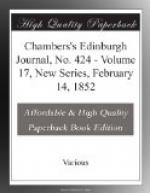Some of the political rumours are worthy of republication. The subjoined, from the London news of July 29, 1766, serves to shew how long a political change may be mooted before its effect is tried in this country: ’It is said, a bill will be brought into parliament next session, binding elections for members of parliament to be by ballot.’
And, without at all entering into the discussion of political topics, it may perhaps be observed that the following, taken from the Chronicle of August 10, 1765, points out how an evil of the present day has long been felt and acknowledged: ’We hear the electors of a certain borough have been offered 3000 guineas for a seat, though there is but so short a time for the session of the present parliament.’
Great surprise is expressed (1766) that the consumption of coal in London ‘hath increased from 400,000 odd to 600,000 chaldrons yearly.’ We find that the coal imported into London during the first six months of 1851, amounted to 1,527,527 tons, besides 90,975 tons brought into the metropolis during the same period by railway and canal. ’Carrying coal to Newcastle’ proved a successful speculation on September 25, 1765, when, on account of a strike among the pitmen, ’several pokes of coal were brought to this town by one of the common carriers, and sold on the Sandhill for 9d. a poke, by which he cleared 6d. a poke.’ About the same time, wheat was selling in Darlington and Richmond for 4s. and 4s. 6d. per bushel, after having been nearly double that price only two or three weeks previously.




